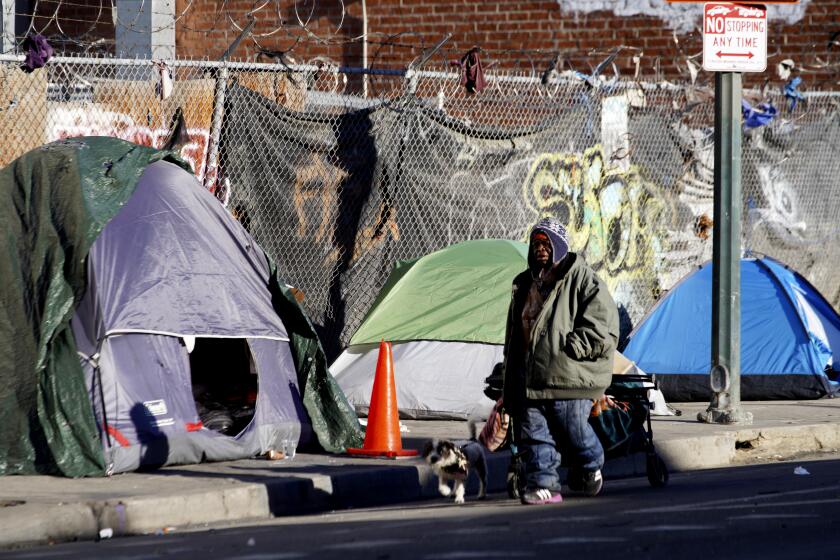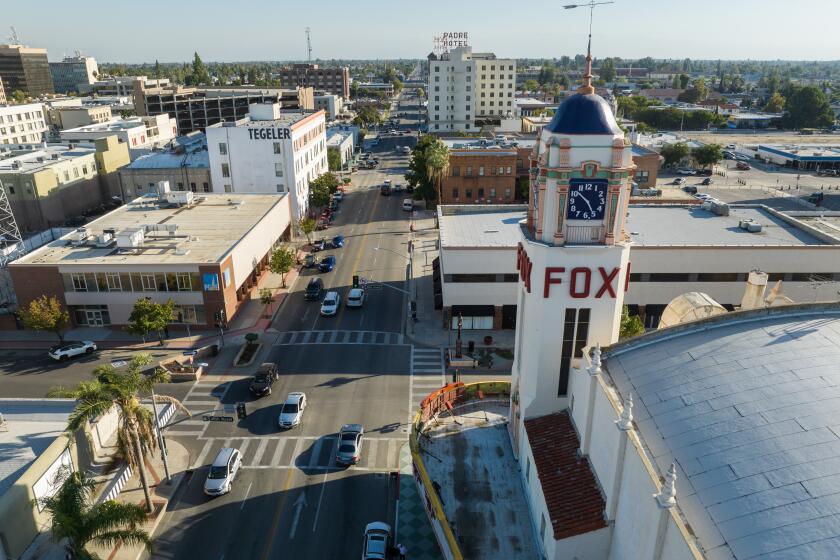Betty Ford a healer in her own right
The venue was a golf course home in the Coachella Valley in the late 1970s. A small group of friends, family members and a nurse had gathered for the most critical day in an alcoholic’s life, the intervention.
In many ways it was a typical moment of truth: You’re sick. Admit it. Get help now. But the alcoholic was Leonard K. Firestone, former ambassador, industrialist and confidant of presidents. And the engineer of the well-rehearsed session was Firestone’s friend and neighbor, none other than Betty Ford, former first lady and recovering alcoholic.
“The end of it was, he left right then, right there -- no packing a toothbrush or anything -- immediately for the clinic,” said Brooks Firestone, now a Santa Barbara County supervisor, who took part in his father’s intervention. Ford “was just outstanding in her warmth and force of personality in convincing him that he had to seek help.... Tough love. That was her.”
Not long after that, the first lady and the former ambassador went on to found the Betty Ford Center in Rancho Mirage. But when the recovery program opened its doors in 1982, Ford was already famous -- for baring her soul, breaking taboos and making America healthier in the process.
President Gerald R. Ford, who died Tuesday, has been eulogized this week as a great healer for a reeling nation, but his outspoken wife, Betty, 88, could easily lay claim to a similar title. While he ministered to the nation’s political pain in the wake of Watergate and Vietnam, she addressed a far more private set of maladies: cancer and addiction.
In the process, she touched thousands of lives. Father Robert G. Certain, rector at St. Margaret’s Episcopal Church in Palm Desert, described Ford on Wednesday as “a strong lady and she’s got great support from those whose lives she’s touched.”
In 1978, Ford underwent her own intervention, led by her then-19-year-old daughter, Susan. The Fords had left the White House after her husband lost the presidency to Jimmy Carter. They had moved across the country to Rancho Mirage.
And she was dependent on “sleeping pills, pain pills, relaxer pills and the pills to counteract the side effects of other pills,” according to her memoir, “Betty: A Glad Awakening.” Before dinner, she routinely had a glass of vodka or bourbon and another after dinner.
Ford announced that she was an alcoholic and checked into a treatment program at the U.S. Naval Hospital in Long Beach a year after leaving the White House. She had three female roommates, went through treatment with sailors and became a model for the therapeutic value of not being dealt with as someone special.
John T. Schwarzlose, president of the Betty Ford Center, called Ford’s candor about her addiction “revolutionary.... She made it OK for a woman to ask for help,” he said in a 2005 interview when Ford stepped down as chairwoman of the center’s board.
“She’d seen the positive reaction she got when she was candid about her breast cancer,” Schwarzlose said at the time. “Her husband said, ‘We didn’t even hesitate going public about this, because we saw how much people were helped by knowing about Betty’s cancer.’ ”
Even before going public with her dependence on alcohol and prescription painkillers in 1978, Ford stunned the nation shortly after her husband was inaugurated. A regular physical had uncovered a lump in her breast. The diagnosis was cancer. The treatment was a mastectomy and chemotherapy.
“It’s hard for anyone born perhaps after 1980 or even in 1970 to understand that these things were not talked about,” said Dr. Patricia Ganz, director of the division of cancer prevention and control research at UCLA’s Jonsson Comprehensive Cancer Center.
“They were very stigmatizing. A woman didn’t dare to mention to her friends, employer, extended family, that she had breast cancer.”
But Ford told the world, and “we saw her survive, courageously, in terms also of her revelations about her addiction to alcohol and drugs,” Ganz added. “She led the way in an openness that wasn’t there in our society in regard to health problems.... She really did it by example. It’s very powerful.”
When Susan G. Komen was diagnosed with breast cancer three years after Ford, she was “terrified,” said her sister, Nancy G. Brinker, founder of the Susan G. Komen Breast Cancer Foundation. There were no support groups, no 800 numbers, no Internet for information and outreach.
“My sister gained enormous strength and courage from Mrs. Ford,” said Brinker, whose foundation is on track to give more than $1 billion for research by the end of 2007. “She used to say to me, ‘If Mrs. Ford can do this, I can do this.’ ”
Brinker had promised her dying sister that she would work to find a cure for breast cancer; when she started the Komen Foundation in 1981, Ford came to the first fundraising luncheon and has supported the group’s work throughout the years.
“If she had not come, we would never have been able to launch,” Brinker said. “I don’t think young women today realize the importance of what she did.... She lit the candle in dark rooms all over the world in healthcare and substance abuse and human understanding.”
*
Times staff writers Mimi Avins and Jonathan Abrams contributed to this report.
More to Read
Start your day right
Sign up for Essential California for news, features and recommendations from the L.A. Times and beyond in your inbox six days a week.
You may occasionally receive promotional content from the Los Angeles Times.






